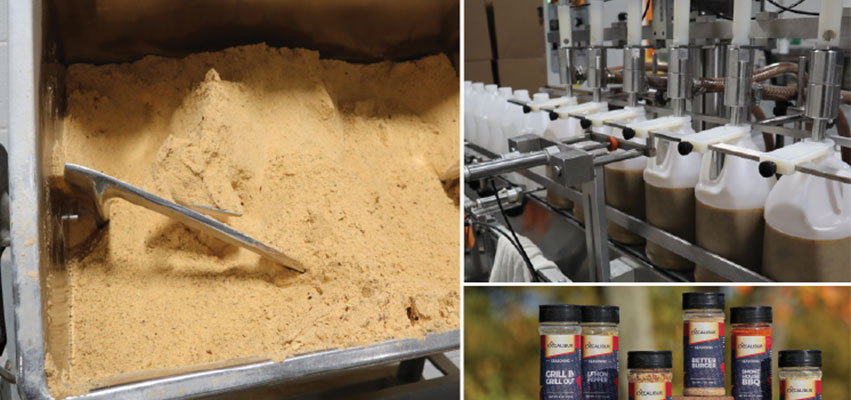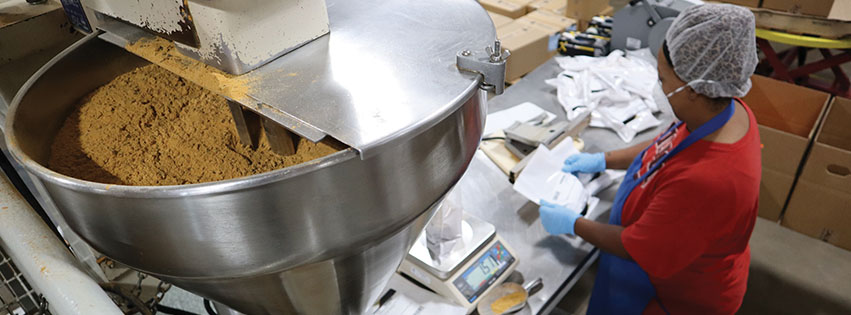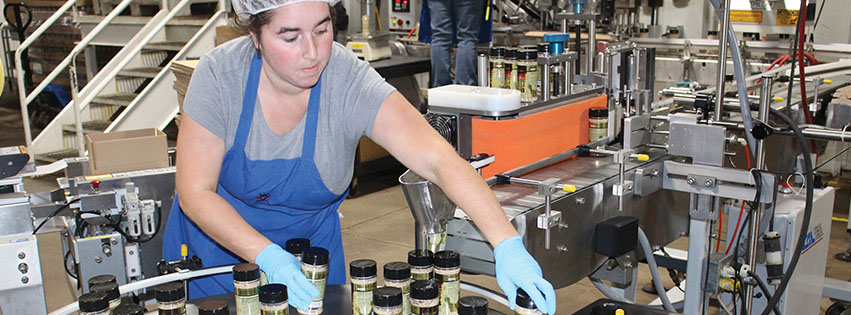
On the south side of Pekin, a longstanding company produces seasonings, blends, marinades, spices and rubs for every aspect of manufacturing and production.
Think of your favorite meal… what comes to mind? Even in the simplest of dishes, flavors are almost always added—whether just salt and pepper, or something more exotic. Spices impart complexity. The smell of a particular spice can bring back a flood of memories—from the warmth of cinnamon on a crisp autumn day to the pungent garlic at your favorite Italian restaurant, sense memories shaped by spices can cause our mouths to water instantly.
Tucked inside the Riverway Business Park in Pekin, Illinois, Excalibur Seasoning is one of the largest spice companies in the United States—and many local residents have never even heard of it. Now in business for over 30 years, the operation creates new spice blends almost daily. The story of how Excalibur’s founder, Jerry Hall, started the company speaks powerfully of the old adage: It’s never too late to start over.
Forging Excalibur
Although Jerry Hall passed away earlier this year, his memory is very much alive in the Excalibur offices. Tom Hornstein, the company’s president, first met Hall when he started working at Excalibur in the mid-1990s. “He was a great guy who never met a stranger,” Hornstein recalls with a smile.
Born in Pekin, Hall went to work at the age of nine. His father owned a grocery store, and it was here that he learned the ins and outs of different cuts of meat—a seed that eventually led to his interest in crafting the perfect taste experience.
After graduating from high school, Hall was drafted into the Korean War. Upon his return, he decided to follow in his father’s footsteps, opening a grocery store in North Pekin. But sales were slow, and Hall struggled financially. When a seasoning salesman stopped by one day, he was honest about his situation. “You know how to make sausages and know all about meat—why don’t you come work for us?” the salesman prodded.
Sensing an opportunity for a new start, Hall left the grocery business behind and moved to Chicago, working his way up to become national sales manager for a major spice company. But then, at the height of his career, the company owner’s daughter fell in love with one of their local salesmen. The owner asked Hall to accept a demotion and allow this salesman to take his job. He refused.
It was 1986. Hall was 53 years old, but he had worked too long to let another family’s drama erase his years of experience. With decades of knowledge of spices and sales, and a host of loyal clients, he decided it was time to start his own company. When he asked his daughter if she had a suggestion for a name, she quickly said, “Excalibur.” He didn’t realize she had just seen the movie of the same name, but he liked it. The name stuck.

Wholesale Blends
When Tom Hornstein joined the company, Excalibur was located in downtown Pekin. While their research and development operations remain downtown—led by Jay Hall, president of R&D and son of the late founder—the factory moved out to the Riverway Business Park, on the city’s southwest corner, in 1995.
As you pull into the parking lot, an aromatic blend of flavorful spices fills the air. Tom Hornstein sneezes as he walks onto the factory floor, excusing himself. “Usually the visitor sneezes first,” he chuckles.
From the beginning, Excalibur was never a retail business—it was always wholesale. “If somebody wanted 20,000 pounds of chicken wing marinade, they would come to us,” Hornstein explains. While its spice blends can be found in all kinds of common food items, most home chefs have never heard of them. “You eat our product even if you don’t know it,” Hornstein notes, rattling off a list of local restaurants that utilize Excalibur spices. But central Illinois is hardly the extent of their core market, he adds. “We ship to all 50 states and six countries.”
The company’s three primary customers are grocery and retail stores, the meat processing industry, and grill masters. “In Peoria, you can go to Alwan’s [Alwan & Sons Meat Co.] or Pottstown [Meat and Deli] and buy our shakers,” he adds. You won’t always see the Excalibur name because they do a lot of private label work—and that’s just fine with Hornstein. “We just like to get the product out there.”
Excalibur holds the key to over 8,000 blends in its massive database of spices—a catalog that grows daily. “Some of them have only seen the light of day once,” Hornstein adds with a laugh. On the other hand, some have become wildly popular, like its Ultimate Steak and Roast Rub, which pairs nicely with meat, seafood or vegetables. But to discover those perfect blends, it takes a team of food experts—and years of experience.

A Taste of Flavor Science
At Excalibur’s R&D lab in downtown Pekin, clients bring their private formulas to be recreated for mass production and distribution. “These are the recipes they keep behind the picture on the wall for safekeeping—family secrets and all that stuff,” Hornstein explains. “We do non-disclosure agreements with them. And then we'll take their formula and turn it into a commercial application.”
The R&D staff produces around three to five new flavors each week. “If somebody says they want an Italian sausage, or they want something with heat—anything—we can narrow it down,” Hornstein says. “Everything we get requests for… we’ve attempted before.” The company also make use of flavors developed at “flavor houses,” which supply the food industry with different flavors. One of them, for example, is called “burnt pan drippings,” which has a taste that is fairly self-explanatory. “If somebody wants to recreate their mom's turkey from home, but they want the turkey and the drippings—the ones that burn on the edge—we can do that,” Hornstein notes.
Back at the factory, our tour leads into a room infused with the stinging combination of garlic and barbeque. Several Excalibur workers flash smiles and exchange greetings as they pack storage bladders of warm liquid into boxes for shipment. “Liquids are a completely different science,” Hornstein says, pointing toward a large vat.
Since introducing liquids in 2005, that side of the business has continually grown—all due to his team’s incredible work ethic and tasting abilities. “Someone will come in and want us to make a barbeque sauce for them,” Hornstein offers. “So, they give us a bottle of A-1 and bring in their Kikkoman Soy Sauce and French’s Mustard. They will say, ‘I take a cup of this and two scoops of that, and blend those together, and that's how I make this very delicious barbecue sauce. We would like you guys to make it, but on a commercial scale.’” Because the use of these name-brand products is not feasible, Excalibur develops their own comparable versions. “There's a lot more science that goes into it in terms of making it cost-effective versus dry seasonings,” he adds.
While the team enjoys experimenting and creating their own mixes, industry demand generally requires that they first respond to requests, Hornstein explains. But deciphering a recipe requires both skill and practice. If it calls for a teaspoon, the lab must discern whether it needs a level or a heaping teaspoon. Sometimes, a client will simply hand over a label, even if it doesn’t list the ingredients that make the recipe unique. Other times, they might bring a bag of seasoning and ask the lab to duplicate it—no instructions included. “They'll bring us a glaze that is on a roast or on a turkey and say, ‘I want that flavor profile,’” he notes. “And we will duplicate that as well.”
No matter how instructions are delivered, if at all, the R&D team is tasked with creating the perfect blend—and they do it all based on taste. “There’s no magical machine you can put it in,” Hornstein explains. “It’s all talent.” The ability to identify subtle flavors simply by taste is quite extraordinary. “These are people that you wouldn’t invite over to your house for dinner because you're afraid they’re going to find out it came out of a can, right?” he jokes. “They can taste the metal!”
Outside of taste, there are very few tricks that can help these food scientists identify a particular flavor profile. “When you mix a spice in water, some things settle and some things float,” Hornstein notes. “Sometimes they do a microscopic inspection to try to identify it.” But because of their training and extensive experience, most flavors are familiar enough to be identified immediately.
Surprisingly, it doesn’t take long to duplicate any given recipe. “Generally we can hit a duplication the first time. Sometimes the second time… and that’s only gotten better in the course of our history,” Hornstein notes with pride. “Our technical advice in the industry is second to none. We’ve had Oscar Meyer call us to figure out problems with their pepperoni.”
In fact, Excalibur has the shortest lead time in the industry. “Seven days,” Hornstein declares, compared to two or more weeks with the majority of its competitors. This is critical when it comes to seasonings, he adds. “If you have a 10,000-pound meat block that has been thawed out and you forgot to order seasoning, you’ve got a problem. We don't make heart valves—we’re not saving lives—but our product is important to our customers.”

Managing Consumer Trends
Excalibur’s Pekin factory stores more than 700 ingredients, nearly 99 percent of which comes from other countries. They must be cleaned for bacteria and stored properly, a task that falls to their staff of over 100. Besides keeping their current customers happy, Hornstein says they must also pay attention to emerging trends. Today’s buyers, for example, are looking to integrate flavors from all over the globe. “Everybody wants something unique,” Hornstein says.
The clean label movement, which advocates for fewer ingredients that are clear and transparent about their origins, and the push to remove genetically modified organisms (GMOs) have also changed how Excalibur runs their business. It all costs money—but seems to happen at the whim of public opinion.
When the public turned against MSG, for instance, Excalibur had to find a way to remove it. “We would use thousands of pounds of MSG a week. Now, it’s a fraction of that,” Hornstein explains. This might seem simple, but the removal of a single ingredient can dramatically alter an entire recipe—as well as its cost considerations. “MSG was a fairly inexpensive ingredient,” he continues. “Some of these other natural flavor enhancers quadruple the price.”
While some clients are willing to pay the higher price, others prioritize lower expenses. When Hornstein first entered the business, he thought everyone would want the best flavor profile possible—but soon discovered that just wasn’t the case. “We deal with delis in Chicago, high-end restaurants, supermarkets, correctional centers, school districts… Their approach to food and what they need to provide their customer base are all completely different.”
Excalibur handles all of these requests while maintaining a rigorous food safety certification known as Safe Quality Food (SQF) Level 3. “There’s one other spice company that operates at an SQF Level 3,” Hornstein notes, “and they’re called McCormick.” Nearby on the factory floor, workers sit at computers and track the usage of each ingredient. If they learn that one of the ingredients has an issue, they can trace it and recall all products in less than 15 minutes.
Amidst all of the safety processes, regulatory paperwork and flavor research, it’s clear from watching Hornstein interact with his staff that they are proud of what they do—and it shows. “People come in here and say, ‘You guys laugh a lot.’ Yeah, we do. That's good, as long as we still get the work done… and we've successfully done that for years.” iBi

